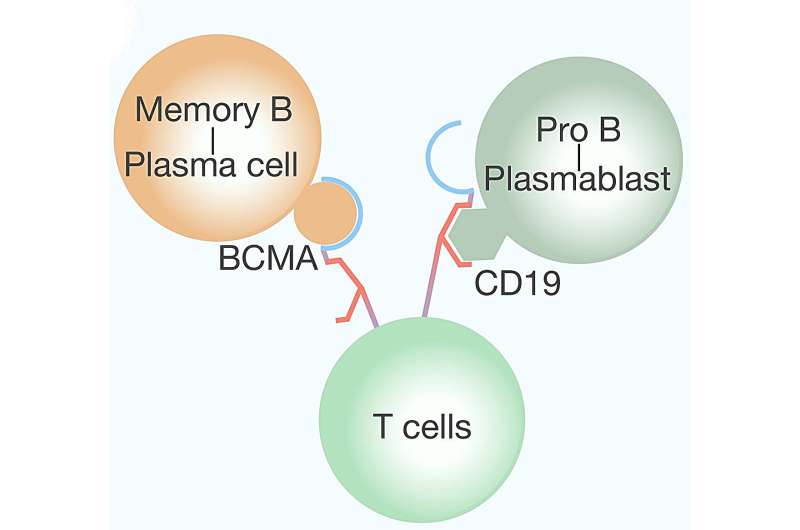This article has been reviewed according to Science X's editorial process and policies. Editors have highlighted the following attributes while ensuring the content's credibility:
fact-checked
proofread
CIDP study explores dual-target CAR-T cell therapy for the treatment of relapsed/refractory autoimmune disorders

Chinese scientists reveal the feasibility, tolerability, and efficacy of BCMA-CD19 bispecific CAR T-cells for treating chronic inflammatory demyelinating polyneuropathy (CIDP) and highlight the potential of CAR-T cell therapy in treating relapsed/refractory autoimmune disorders. This strategy is a promising step toward creating a potentially curable treatment for CIDP.
The research is published in the journal hLife.
This study was led by Professor Junnian Zheng and Ming Shi from the Cancer Institute of Xuzhou Medical University, together with the team of Professor Guiyun Cui and Wei Zhang from the Affiliated Hospital of Xuzhou Medical University. The team reported for the first time using BCMA-CD19 bispecific CAR T cells for treating relapsed/refractory CIDP.
CIDP is an uncommon condition with sudden onset symptoms, including nerve damage affecting movement, sensation, speech, breathing, and heart rate. Over 80% of people develop muscle weakness, impaired gait, absent tendon reflexes, sensory loss, balance problems, and, in severe cases, paralysis, irregular heart rhythm, and difficulty breathing. Currently, treatments such as glucocorticoids, plasma exchange, and intravenous gamma globulin (IVIg) can help manage symptoms but cannot completely eradicate the disease.
In recent years, chimeric antigen receptor (CAR)-T cell therapy has achieved remarkable efficacy in hematologic tumors and many diseases represented by systemic lupus erythematosus. The team reported using BCMA-CD19 bispecific CAR T cells for treating relapsed/refractory CIDP.
B cell clearance coupled with anti-CD20 antibody has been used to treat CIDP. However, CD20 and CD19 are mainly found during earlier stages of B cell development and do not appear on long-lived plasma cells.
Taking advantage of the BCMA protein's presence in plasma blasts and long-lived plasma cells, researchers at Xuzhou Medical University designed bispecific CAR-T cells that target both CD19 and BCMA, aiming to reset the balance of immune responses by temporarily and deeply eradicating B cells and plasma cells.
A 44-year-old man with relapsed/refractory CIDP exhibited distal limb numbness and weakness. Following the 2021 European Society of Neurology/Society of Peripheral Neurology CIDP Guidelines, he was diagnosed with distal CIDP without IgG4 autoantibodies. Post-admission evaluation and discussion led to his eligibility for bispecific CAR-T therapy for autoimmune disease, which he successfully underwent.
Following CAR-T cell therapy, the patient has made significant progress in functioning as per INCAT disability and MRC scores. Remarkably, almost full muscle power recovery was observed 180 days after CAR-T administration, paralleling his ability to walk again.
Initially, it took them 21 seconds to cover a 10-meter walk, but by day 180, they managed it in just 13 seconds. Post-treatment electrophysiological assessments of median, ulnar, common peroneal, and tibial nerves showed significant improvement.
After the initial 180-day follow-up, we checked in with them every 90 days to monitor any potential relapse. Remarkably, for more than a year, this patient could discontinue all immunosuppressants without disease recurrence, and the presence of GM4 and GD3 antibodies continued to diminish even after 3 months of CAR-T cell therapy.
Regarding safety, the patient developed fever (38–39°C) and transient IL-6 elevation 6–14 days after CAR-T cell therapy and were treated symptomatically with acetaminophen. The patient developed hypotension (86–97/35–59 mmHg, grade 2) 1–15 days after CAR T cell infusion and recovered after 2 weeks of bed rest and plenty of water. No other toxicity associated with CAR-T cell therapy was observed.
This case shows how viable, well-tolerated, and effective BCMA-CD19 bispecific CAR T cells are for treating stubborn/repetitive CIDP. Even without continued immunosuppressants, remission stayed put despite B cell levels rising again. Also, it has the potential to help those suffering from autoimmune nerve disorders linked to B cells, such as neuromyelitis and myasthenia gravis.
This study highlights the change in patient symptoms after treatment and affirms the safety of CAR-T cell therapy for CID. While a single case report, more extensive studies, and extended follow-up, which is on the way, would add significant clinical value. It highlights the potential of CAR-T cell therapy in treating relapsed/refractory autoimmune disorders. This "dual-target" strategy is a promising step toward creating a potentially curable treatment for CIDP.
More information: Wei Zhang et al, BCMA-CD19 bispecific CAR-T therapy in refractory chronic inflammatory demyelinating polyneuropathy, hLife (2024). DOI: 10.1016/j.hlife.2024.05.005


















